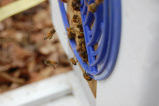|
As the days grow shorter and the temperatures drop, many creatures begin to prepare for hibernation. But for honey bees, the work is just beginning as they get ready for the colder months. Winter honey bees play a vital role in ensuring the survival of the colony through the harsh winter months. What Makes Winter Bees Different? Winter honey bees are larger and have larger fat bodies than summer honey bees. This is because they need to store more energy to survive the cold winter months. They are also fed a diet that is lower in protein and higher in carbohydrates, which helps them to generate heat which is critical to the hives survival. In addition to their physical differences, winter honey bees also have a different lifespan than summer honey bees. Winter honey bees can live for up to six months, while summer honey bees only live for about six weeks. This is because winter honey bees do not have to expend energy on foraging for food, as they have access to the honey that was stored by the summer bees. Less flying, means better wing structure and strength. How Winter Bees Keep the Colony Warm When the temperature outside drops below 50 degrees Fahrenheit, honey bees cluster together to form a "heat ball." The bees in the center of the heat ball vibrate their flight muscles to generate heat. The outer layers of bees act as insulation, keeping the heat in and the cold out. The heat ball is constantly moving, as the bees on the outside rotate inward to take their turn generating heat. This process allows the colony to maintain a stable temperature of around 95 degrees Fahrenheit, even when the temperature outside is freezing. As long as the bees have enough food stores and a large enough population they can keep the hive warm. During last winter's cold plunge of -20 degrees Fahrenheit temperatures our hives stayed toasty warm. Why Winter Bees are Ready to Fly in the Spring By the time spring arrives, winter honey bees are ready to start foraging for food again. They have the energy they need to fly long distances and collect nectar and pollen. They also have retained all the experiences of working various roles in the hive. These overwintered bees are some of the best bees one can have going into the warmer months. Some of our top performing hives are these winter warrior hives that have made it through a harsh winter and are rearing to go into the pollinating season.
0 Comments
Leave a Reply. |
Details
SEABEE HONEY BLOGAuthorA beekeeper in New Hampshire [email protected] Archives
December 2023
Categories
All
|

 RSS Feed
RSS Feed